|
 Secure Site
Secure Site
|
 |
Archive for the 'Sleep Habits' Category
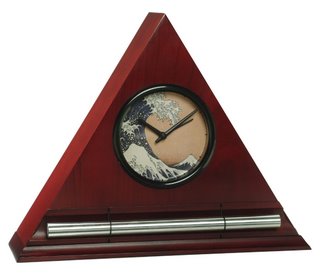 Just Say No to a Snooze Button, Get the Zen Alarm Clock Most modern alarm clocks include a “snooze button” mechanism which allows the user to go back to sleep for a brief period after the initial alarm.
While this may make it easier for some people to “face the day,” here at Now & Zen we feel the whole concept of a snooze button is “all wrong.”
People want snooze buttons because they want to awaken gradually. And this is only natural because just as our bodies fall asleep gradually, our bodies also want to wake up gradually. However, with a regular, snooze button-equipped alarm clock the user is initially “startled awake” by the alarm, and then continually startled awake with each press of the snooze button. This is not the way to treat your body because it creates a kind of merry-go-round of multiple “rude awakenings.”
As an alternative we recommend using our Zen Alarm Clock, which wakes users gradually with a built-in 10 minute progression of gradually increasing acoustic chimes. It really is a better way to get up in the morning.
Zen Alarm Clocks make waking up a beautiful experience. And once you experience the Zen Clock’s gradual 10 minute chime progression, you will never want to wake up any other way again.
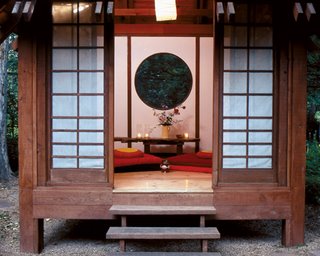 Zen Clocks without Snooze buttons
Now & Zen Headquarter Store
1638 Pearl Steet
Boulder, CO 80302
(800) 779-6383
Posted in sleep, Sleep Habits, Zen Alarm Clock
 Dreams May Improve Our Memory - Toyokuni Utagawa, Flower Arrangement Getting a good night’s sleep after trying to master a tough new task might just reinforce what you have learned.
European researchers say dreaming might be the brain’s way of replaying experiences and lessons so that they are fixed in the memory for use later on.
The scientists used advanced imaging technology and found that the same regions of the brain that are buzzing while we learn a new task are also active while we dream. This heightened activity was observed during the brief but active stage known as rapid-eye movement, or REM, sleep.
The study was published in the August issue of Nature Neuroscience and was led by Pierre Maquet of the University of Liege in Belgium.
Animal studies had shown similar results. Rats that ran new routes through mazes showed increased activity in the same portions of their brains when they slept afterward. But the human brain is more complex.
“It is wonderful to see such results demonstrated in humans for the first time,” said David Silbersweig, co-director of the functional neuroimaging research laboratory at the New York-Cornell Medical Center.
Why Sleep? Humans spend one-third of their lives asleep, but sleep’s purpose is poorly understood. Among other things, scientists believe dreaming may help sort out emotions, impressions and other ideas.
In the study, 18 volunteers ages 18 to 25 spent several hours learning how to quickly recognize symbols as they flashed on a computer screen and press the same symbol on a keyboard.
During the test, the activity in several regions of their brains was monitored by PET scans, which reveal how the brain is functioning by watching its use of glucose and oxygen, the fuels of brain cells.
 Can Dreams Help Improve Our Memory? Groups of volunteers were tested in several ways. Those who took the computer test for several hours, slept and retook the test when they woke up scored the highest, with even faster reaction times after they slept.
PET scans showed that during REM sleep their brain activity and blood flow were similar to when they were taking the test.
Researchers said the volunteers might have been practicing the test in a REM dream and storing what they learned.
However, Maquet’s team could not identify the precise cellular mechanisms involved. Nor are all memories consolidated only during REM sleep, the researchers said.
Boulder, Colorado—an innovative company has taken one of life’s most unpleasant experiences (being startled awake by your alarm clock early Monday morning), and transformed it into something to actually look forward to. “The Zen Alarm Clock,” uses soothing acoustic chimes that awaken users gently and gradually, making waking up a real pleasure.
Rather than an artificial recorded sound played through a speaker, the Zen Clock features an alloy chime bar similar to a wind chime. When the clock’s alarm is triggered, its chime produces a long-resonating, beautiful acoustic tone reminiscent of a temple gong. Then, as the ring tone gradually fades away, the clock remains silent until it automatically strikes again three minutes later. The frequency of the chime strikes gradually increase over ten-minutes, eventually striking every five seconds, so they are guaranteed to wake up even the heaviest sleeper. This gentle, ten-minute “progressive awakening” leaves users feeling less groggy, and even helps with dream recall.
adapted from abcnews.go.com by Joseph B. Verrengia
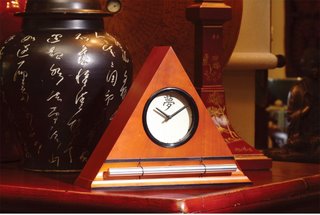 The Zen Alarm Clock transforms mornings, awakening you gradually with a series of gentle acoustic chimes Once you use a Zen Clock nothing else will do Now & Zen – The Zen Alarm Clock Store
1638 Pearl Street
Boulder, CO 80302
(800) 779-6383
orders@now-zen.com
Posted in Bamboo Chime Clocks, Insomnia, sleep, Sleep Habits
 Choose a Gentle Wake Up in the Morning -- The Z E N Alarm Clock A Sleep in America Poll released by the National Sleep Foundation in 2008 reported that 65 percent of Americans have trouble falling asleep, wake during the night or wake feeling unrefreshed at least a few times each week. (On average, individuals need at least eight hours of sleep, but a recent finding that genetic makeup may play a role in how much sleep each person needs was published by UCSF researchers last week.)
Boulder, Colorado—an innovative company has taken one of life’s most unpleasant experiences (being startled awake by your alarm clock early Monday morning), and transformed it into something to actually look forward to. “The Zen Alarm Clock,” uses soothing acoustic chimes that awaken users gently and gradually, making waking up a real pleasure.
Rather than an artificial recorded sound played through a speaker, the Zen Clock features an alloy chime bar similar to a wind chime. When the clock’s alarm is triggered, its chime produces a long-resonating, beautiful acoustic tone reminiscent of a temple gong. Then, as the ring tone gradually fades away, the clock remains silent until it automatically strikes again three minutes later. The frequency of the chime strikes gradually increase over ten-minutes, eventually striking every five seconds, so they are guaranteed to wake up even the heaviest sleeper. This gentle, ten-minute “progressive awakening” leaves users feeling less groggy, and even helps with dream recall.
adapted from SFgate.com by Carolyne Zinko
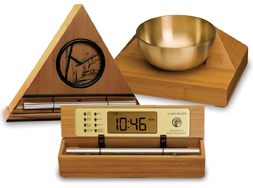 Gentle, Soothing, and Elegant Sounding Alarm Clocks -- No Beeping Electronics
Now & Zen – The Zen Alarm Clock Shop
1638 Pearl Street
Boulder, CO 80302
(800) 779-6383
orders@now-zen.com
Posted in Bamboo Chime Clocks, Natural Awakening, sleep, Sleep Habits, wake up alarm clock, Well-being
 Choose The Zen Alarm Clock - for a Gentle, Progressive Awakening Sleep deprivation is a little known, but serious national problem.
So believes Dr. William Dement, M.D., Ph.D., considered the world’s leading authority on sleep, sleep deprivation and the diagnosis and treatment of sleep disorders.
A groundbreaking pioneer in the early days of sleep research, Dement is an outspoken advocate for sleep awareness as a cure for what he calls a “sleep-sick society.” He recently authored a book, “The Promise of Sleep”, a comprehensive overview of what happens when we sleep, its effect on overall health, and the dangers of sleep loss and deprivation.
Still active in the field at age 71, Dement draws upon four decades of experience as a dedicated scientist, sleep doctor, and clinic and laboratory administrator. He is the founder and director of the Stanford Sleep Disorders Center, the world’s first sleep disorders center, where people continue to seek treatment, and research is ongoing.
His book is a definitive guide to sleep and what he calls its “vital connection between health and happiness.” Co-written with Christopher Vaughan, the 540-page book covers everything from the definition of sleep and history of sleep and sleep disorder research, to chronic disorders and treatments.
Dement explores the connection between sleep and physical and mental well-being, presents insightful background on dreams – one of his early interests, and offers a step-by-step guide to help people take personal stock of their sleep needs at any age. Readers will also find useful information about the variety of disorders that exist and their definitions, and a listing of sleep center locations by state and sleep-related Web sites.
“Sleep deprivation is an across-the-board problem. But society is completely ignorant about sleep. It’s time people wake up and move sleep education into the mainstream,” said Dement, whose expertise is frequently sought.
Some of the world’s biggest catastrophes can be linked, in part, to sleep deprivation, incidents such as the Three-Mile Island nuclear event, Exxon Valdez oil spill, and even the Challenger shuttle explosion. “These events happened because someone fell asleep,” said Dement.
“In a recent survey by the National Sleep Foundation, 23 percent of people polled admitted to falling asleep while driving,” Dement writes in his book. “With this mind, it should come as no surprise that sleep deprivation plays a major role in most accidents labeled “cause unknown,’ or that an estimated 24,000 people die each year in accidents caused directly or in part by falling asleep at the wheel. Almost all of us, regardless of our formal education, are dangerously misinformed about drowsy driving and its causes.”
Dement serves as chairman of the National Commission on Sleep Disorders Research, whose report led to creation of the National Center on Sleep Disorders Research – a new agency within the National Institutes of Health.
 Choose A Soothing Alarm Clock - Sleep deprivation is a little known, but serious national problem. In 1992, the commission’s report to Congress, “Wake Up America: A National Sleep Alert” urged more federal funding for sleep research, and a campaign of public awareness about the nature and impact of sleep disorders, calling sleep deprivation “a national emergency.”
Dement in 1975 launched the American Sleep Disorders Association and served as president for a dozen years. He teaches a popular “Sleep and Dreams” course at Stanford and wrote the first undergraduate textbook in the field.
“People don’t realize that sleep loss piles up like a debt. People think that sleep debt goes away, but it only gets bigger,” said Dement, who continues to address the problem before civic and business groups, governmental bodies and health professionals across the country.
“I’m sounding the alarm in every way I can.”
Waking up in the morning should be as pleasant as falling asleep at night. The Zen Alarm Clock’s gradual, gentle awakening is transformative.
Boulder, Colorado—an innovative company has taken one of life’s most unpleasant experiences (being startled awake by your alarm clock early Monday morning), and transformed it into something to actually look forward to. “The Zen Alarm Clock,” uses soothing acoustic chimes that awaken users gently and gradually, making waking up a real pleasure.
Rather than an artificial recorded sound played through a speaker, the Zen Clock features an alloy chime bar similar to a wind chime. When the clock’s alarm is triggered, its chime produces a long-resonating, beautiful acoustic tone reminiscent of a temple gong. Then, as the ring tone gradually fades away, the clock remains silent until it automatically strikes again three minutes later. The frequency of the chime strikes gradually increase over ten-minutes, eventually striking every five seconds, so they are guaranteed to wake up even the heaviest sleeper. This gentle, ten-minute “progressive awakening” leaves users feeling less groggy, and even helps with dream recall.
adapted from sfgate.com by Elaine Larson
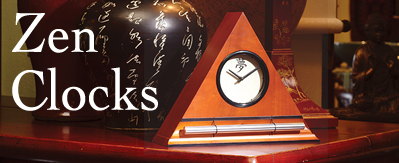 The Zen Alarm Clock Shop - Boulder, CO Now & Zen – The Zen Alarm Clock Shop
 The Zen Alarm Clock Showroom - Boulder, CO - orders@now-zen.com 1638 Pearl Street
Boulder, CO 80302
(800) 779-6383
orders@now-zen.com
Posted in Bamboo Chime Clocks, sleep, Sleep Habits
 Choose a gentle, chime alarm clock - an alternative, soothing alarm clock When Margaret Chau has a bad night’s sleep, she knows to steer clear of loved ones the next day – she’s cranky and impatient, and she tends to take it out on others.
“I don’t want to deal with things because I’m afraid of not being able to do it rationally or logically,” said the Millbrae woman, who suffers from chronic insomnia due to back pain. “I know myself, and I don’t want to react badly or do something I might regret.”
It’s no secret that the sleep-deprived are usually grumpy, miserable and not much fun to be around, but new research from UC Berkeley using brain-scanning equipment helps explain why. The study, which was published Monday in the journal Current Biology, was the first to use MRI technology to show exactly what areas of the brain are affected by sleep deprivation.
Results show a connection between negative thinking and lack of sleep, and while there is still years, if not decades, of research to be done on the subject, the study’s authors say it could point to a connection between sleep deprivation and psychiatric disorders like depression and post-traumatic stress syndrome.
It could even help explain road rage, said Matthew Walker, director of UC Berkeley’s Sleep and Neuroimaging Laboratory and senior author of the study, which was coordinated with researchers from Harvard University.
“One of the functions of sleep is to reset and replenish the emotional integrity of our brain circuits so we can approach the day’s emotional challenges in appropriate ways,” Walker said. “If you don’t get a good night’s sleep, you’ll be making irrational choices.”
 Choose a peaceful chime alarm clock Americans are among the most sleep-deprived people in the world, doctors and sociologists say. About 40 percent of Americans get less than seven hours of sleep a night, according to a 2005 poll conducted by the National Sleep Foundation, and 75 percent reported having some sort of sleep disorder one or two nights a week.
National guidelines recommend people get between seven or eight hours of sleep a night.
Polls also show that Americans are getting less sleep all the time, as people deal with daily distractions, from work and family life to just staying up late watching TV or surfing the Internet. The National Sleep Foundation poll found that only 26 percent of adult Americans were getting at least eight hours of sleep a night in 2005, compared to 35 percent in 1998.
But lack of sleep isn’t just confined to adults.
Dr. Rafael Pelayo, director of Pediatric Sleep Service at Lucile Packard Children’s Hospital, said he’s noticed sleep deprivation is a growing problem among teenagers.
“They seem to be modeling their parents and getting as little sleep as possible. They’re routinely staying awake past their parents and they’re drinking more coffee,” Pelayo said. “Sleep is still an afterthought for most people; it’s something they can sacrifice. But sleep is actually an important cornerstone of health.”
Lack of sleep can lead to a loss of concentration and memory, can make people more sluggish and reduce motor skills, and can even weaken the immune system. But it also increases activity in the parts of the brain related to a variety of psychiatric disorders, according to the new research.
In the UC Berkeley study of 26 young adults, half of the subjects were kept awake for 35 hours straight and the other half were allowed a normal night’s sleep in that same time period. Then all of the subjects were hooked up to an MRI and shown a series of images, some of them disturbing pictures of graphic violence or gory injuries. Researchers monitored what happened in their brains as each image was shown.
When shown the disturbing images, the sleep-deprived subjects had a significant jump in activity in the amygdala, the section of the brain that puts the body on alert to protect itself. At the same time, activity slowed down in the prefrontal cortex, which controls logical reasoning.
Subjects who had gotten a full night of sleep showed normal brain activity.
What this means for most people is that a sleepless night can cause them to overreact to emotional challenges that they would otherwise be able to tolerate with no trouble, Walker said.
That’s why new parents might be more prone to snap at each other over petty arguments, or morning commuters might be more likely to lay on the horn when someone cuts them off instead of just let it go, Walker said. It also might make horror movies scarier, as the brain doesn’t do quite as good a job at separating fact from fiction.
“We become emotionally dis-regulated,” Walker said. “Ordinarily, if you saw a gun pointed at your face, you wouldn’t overreact because your brain puts it in context and tells you that you’re sitting in a movie theater staring at a screen. But that function seems to be disconnected when you’re sleep-deprived.”
Much more research needs to be done, Walker said, but sleep experts are already hopeful that more study could lead to refined options for treating not just sleep disorders, but psychiatric problems such as depression and anxiety.
Dr. Anil Rama, medical director of the Regional Sleep Medicine Laboratory at Kaiser Permanente in San Jose, said he’s intrigued by Walker’s research, but notes that the brain responses to sleep deprivation are likely so complicated that not much will change in terms of treatment any time soon.
Eventually, “if we start looking at the pathways that are involved with sleep deprivation, perhaps we can intervene there,” he said. “But I’m skeptical that isolating one particular pathway is very important. It has to be in the context of a whole body of literature, and there are so many things our emotional centers are tied into.”
adapted fro SFgate.com by Eric Allday
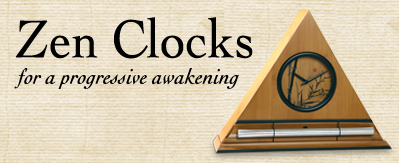 Peaceful Chime Alarm Clock - The Zen Clock Store - Boulder, CO Now & Zen – The Zen Alarm Clock Shop
 The Peaceful Alarm Clock Store - Boulder, CO 1638 Pearl Street
Boulder, CO 80302
(800) 779-6383
orders@now-zen.com
Posted in Bamboo Chime Clocks, sleep, Sleep Habits
 Do you want an alarm clock with real, acoustic sounds - choose The Zen Clock from Now & Zen Are you and your partner at odds over your sleeping arrangements? Does one person snore in bed and the other hog the covers? Do you hate your spouses radio alarm clock?
If sleeping next to your partner is a struggle, you’re not alone. One in fourAmerican couples sleep separately, according to a study by the National Sleep Foundation. Often the problem is not intimacy, but the seemingly simple act of sharing a bed with a spouse.
The Wall Street Journal reports that while many couples have learned to compromise in other areas of their lives, they can’t find common ground on sleeping together.
Couples often have different sleeping habits and preferences — like room temperature, watching TV in the bedroom or when to turn the lights off — and experts say it takes communication and compromise to share the sack.
Buy The Zen Alarm Clock – it will transform your husbands mornings, and awakening you gradually with a series of gentle acoustic chimes Once you use a Zen Clock nothing else will do.
Boulder, Colorado—an innovative company has taken one of life’s most unpleasant experiences (being startled awake by your alarm clock early Monday morning), and transformed it into something to actually look forward to. “The Zen Alarm Clock,” uses soothing acoustic chimes that awaken users gently and gradually, making waking up a real pleasure.
Rather than an artificial recorded sound played through a speaker, the Zen Clock features an alloy chime bar similar to a wind chime. When the clock’s alarm is triggered, its chime produces a long-resonating, beautiful acoustic tone reminiscent of a temple gong. Then, as the ring tone gradually fades away, the clock remains silent until it automatically strikes again three minutes later. The frequency of the chime strikes gradually increase over ten-minutes, eventually striking every five seconds, so they are guaranteed to wake up even the heaviest sleeper. This gentle, ten-minute “progressive awakening” leaves users feeling less groggy, and even helps with dream recall.
 Alarm Clocks with Real Sounds - No Electronic Sounds - Boulder, CO Now & Zen – The Zen Alarm Clock Store
Alarm Clocks with Chimes – no Electronic Sounds
1638 Pearl Street
Boulder, CO 80302
(800) 779-6383
orders@now-zen.com
Posted in Bamboo Chime Clocks, sleep, Sleep Habits, Well-being, Zen Alarm Clock
 Sounder Slumber with Natural Chime Alarm Clocks There’s a growing body of evidence linking sleep deprivation to poor physical health. Now there’s a study that suggests sleeplessness can hurt your fiscal fitness too.
Researchers at Duke University have found out that sleep deprivation boosts the part of your brain that tends toward optimism,; it also leads the part of your brain that processes negative outcomes to pipe down. As the news releases noted:
Sleep-deprived individuals in the study tended to make choices that emphasized monetary gain, and were less likely to make choices that reduced loss.
Although the study examined the way people in casinos behaved, it’s worth pondering how sleeplessness could be affecting your everyday financial decisions.
It’s one thing to be a sleep-deprived new parent and pony up for the Cloud b Sleep Sheepbecause you are desperate for the baby to sleep anywhere other than your arms ( … um. Not that I speak from personal experience. Or am bitter it didn’t work).
But is it possible that the chronically sleep deprived might be more prone to false thrift because they’re focusing more on the perceived financial benefits than on the realistic and likely drawbacks? Or perhaps their fiscal discipline is napping while they’re still up. In the bookNurtureShock: New Thinking About Children, authors Po Bronson and Ashley Merryman write:
Sleep loss debilitates the body’s ability to extract glucose from the bloodstream. Without this stream of basic energy, one part of the brain suffers more than the rest — the prefrontal cortex, which is responsible for what’s called “Executive function.” Among those executive functions are the orchestration of thoughts to fulfill a goal, prediction of outcomes, and perceiving consequences of actions.
Working toward goals, thinking through consequences — those sound like two of the governing mechanisms that help people manage their spending and saving.
Perhaps somewhere Benjamin Franklin is smiling. After all he is the one who said, “Early to bed and early to rise, makes a man healthy, wealthy and wise.”
 One of the ultimate Zen like experiences is waking-up from a great slumber refreshed and energized. The right alarm clock can be the most beneficial investment for you. With our Now & Zen natural alarm clock you are awakened more gradually and thus more naturally. Now & Zen is focused on creating a naturalistic lifestyle, and our clocks are an example of our philosophy.
One of the ultimate Zen like experiences is waking-up from a great slumber refreshed and energized. Your mind and body are harmoniously one, both alert and focused. Having a refreshed mind and body are two keys to a natural and Zen lifestyle. Waking up in the morning should not be a loud and abrupt awakening, but rather it should be a peaceful positive experience. The right natural alarm clock can transition your deep and tranquil sleep into a serene start to consciousness. Imagine a long-resonating Tibetan bell-like chime waking you up to a beautiful morning experience.
adapted from sfgate.com by Lisa Schmeiser
Now & Zen – The Chime Alarm Clock Store – Downtown Boulder
1638 Pearl Street
Boulder, CO 80302
(800) 779-6383
Orders@now-zen.com
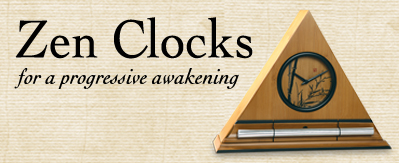 The luxurious awakening provided by the Zen Alarm Clock is part of the growing preference for things natural—natural foods, natural fibers, and now, natural acoustic sounds.
Posted in Bamboo Chime Clocks, Chime Alarm Clocks, Natural Awakening, sleep, Sleep Habits
 Unusual Soothing Alarm Clocks by Now & Zen, Inc. - Boulder, CO
Waking up in the morning is a metaphor for life — a kind of daily microcosmic reenactment of our overall purpose for being in the world. That is, just about every religious tradition emphasizes spiritual growth. And the connection between “awakening” and spiritual growth can be found in practically all forms of spiritual teaching.
So if waking up in the morning really is a metaphor for our larger spiritual lives, this perspective might help us treat our morning ritual of getting out of bed as a kind of spiritual practice. Indeed, when approached in this way, how we wake up in the morning can make a larger difference in our lives overall.
Perhaps this is stretching the matter, but there are many people who do recognize that something as simple as waking up in the morning can be an authentic form of spiritual practice. For those who don’t have to go to work or get the kids to school, waking up naturally, whenever their body feels like it, can be a wonderful version of this practice. Waking up without an alarm, whenever your body has had enough rest, is probably the healthiest option, and the one that will leave us feeling most refreshed and ready to start the day. However, there are few of us that have this luxury, especially during the week.
 Sleep Sounder - Choose an Unusual Soothing Clock with Acoustic Chime Fortunately, for those who want to wake up right, without being startled awake by an annoying alarm or some radio DJ, there is The Zen Alarm Clock. This clock was designed to make waking up a kind of spiritual practice. The Zen Clock wakes users with a built-in 10 minute gradual progression of acoustic chimes. And this gradual form of “progressive awakening” has been thoughtfully designed to include esoteric features that are fitting for a form of spiritual practice. For example, not only is the hardwood Zen Alarm Clock beautiful to see and hear, the clock’s chime is tuned to produce the same frequencies as the tuning forks used by musical therapists in their healing work. Moreover, the Zen Clock’s pre-programmed 10 minute chime progression sequence advances according to the “golden ratio,” which reflects both the natural proportions of our own bodies and the patterns of growth used in the overall evolution of the universe. Even those who care little about such esoteric details nevertheless report that they love waking up with the gentle chimes of a Zen Alarm Clock. And as the makers of the Zen Alarm Clock hope, we may eventually come to see many of the simple details of our lives as forms of authentic spiritual practice. 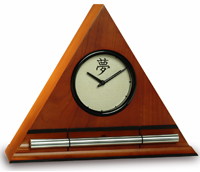 Waking up in the morning should be as pleasant as falling asleep at night. The Zen Alarm Clock's gradual, gentle awakening is transformative. Now & Zen – The Most Unusual Alarm Clock Headquarter Store
Soothing Acoustic Chime Alarm Clocks & Timers
1638 Pearl Street
Boulder, CO 80302
(800) 779-6383
Posted in Bamboo Chime Clocks, Insomnia, sleep, Sleep Habits
 Choose the Best Alarm Clock to Ring Your Bells - A Courtesan and Attendant on a Moonlit Veranda harunobu The way we want to be awakened varies as much as the timepieces we use to get us up and going.
Invented in 1787, the alarm clock has become a necessity.
“Alarm clocks are a very individual thing,” says Neil B. Kavey, director of sleep disorders for New York-Presbyterian Hospital at Columbian Presbyterian Medical Center in Manhattan. “Some people have very strong preferences when it comes to alarm clocks. People who are sleep-deprived need an alarm that will wake them up instead of the sound of a chirping bird.”
But some people don’t like to be awaken by jarring bells or having to jump out of bed when the alarm sounds. Some people like to sleep an extra hour and therefore set the alarm to go off an hour early, while others like to hit the snooze button.
“Snooze alarms are helpful, but you get an interrupted sleep,” says Kavey, who noted that he is speaking clinically rather than scientifically when it comes to alarm clocks. “It’s best to get an alarm on a clock that you can live with and set it for the latest time possible, so you can sleep straight through till it’s time to get up. If you are getting enough sleep, you may only need a quiet or soothing alarm to wake you. But young people are such intense sleepers that they often require a loud alarm clock.”
Stores are filled with clocks from those that wake you with your favorite music to those that “ring” with the sound of ocean waves, rain, a babbling brook or a breeze blowing through pines.
There are even clocks that simulate the rising sun by gradually increasing the light from a high-intensity bulb during a period of 30 minutes.
“If you are worried about a power outage or getting up on time to catch a plane or for an important meeting, you might want to set two clocks, where one runs on a battery,” says Kavey. “But if you are getting enough sleep on a regular basis, you wouldn’t need an alarm clock. You’d wake up automatically based on your biological rhythms.”
 "The Zen Alarm Clock," uses soothing acoustic chimes that awaken users gently and gradually, making waking up a real pleasure. Just Say No to a Snooze Button
Most modern alarm clocks include a “snooze button” mechanism which allows the user to go back to sleep for a brief period after the initial alarm.
While this may make it easier for some people to “face the day,” here at Now & Zen we feel the whole concept of a snooze button is “all wrong.”
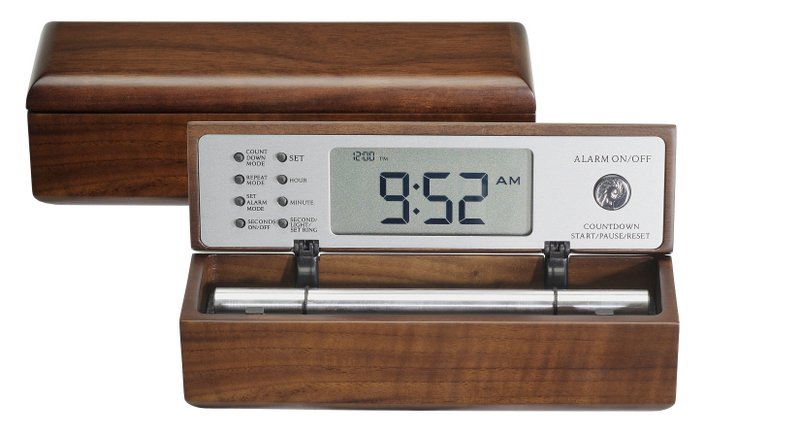 Wake up with gradual, beautiful acoustic chimes. The Zen Alarm Clock transforms your mornings and gets you started right, with a progressive awakening
People want snooze buttons because they want to awaken gradually. And this is only natural because just as our bodies fall asleep gradually, our bodies also want to wake up gradually. However, with a regular, snooze button-equipped alarm clock the user is initially “startled awake” by the alarm, and then continually startled awake with each press of the snooze button. This is not the way to treat your body because it creates a kind of merry-go-round of multiple “rude awakenings.”
As an alternative we recommend using our Zen Alarm Clock, which wakes users gradually with a built-in 10 minute progression of gradually increasing acoustic chimes. It really is a better way to get up in the morning. Zen Alarm Clocks make waking up a beautiful experience. And once you experience the Zen Clock’s gradual 10 minute chime progression, you will never want to wake up any other way again.
adapted from sfgate.com by Frances Ingraham Heins, Albany Times Union
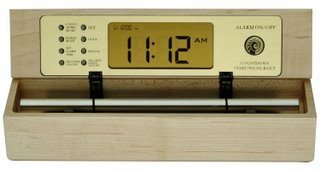 One of the ultimate Zen like experiences is waking-up from a great slumber refreshed and energized. Your mind and body are harmoniously one, both alert and focused. Now & Zen – The Chime Alarm Clocks Store
1638 Pearl Street
Boulder, CO 80302
(800) 779-6383
orders@now-zen.com
 When the clock's alarm is triggered, its chime produces a long-resonating, beautiful acoustic tone reminiscent of a temple gong.
Posted in Bamboo Chime Clocks, sleep, Sleep Habits, wake up alarm clock
 Choose an Alarm Clock with Real Acoustic Sounds -- Chime and Gong Clocks from Now & Zen, Inc. Study: More Sleep, Sharper Brain
Everybody feels refreshed following a good night’s sleep. But can you wake up smarter? More artistic perhaps?
German scientists say they have demonstrated for the first time that our sleeping brains continue working on problems that baffle us during the day, and the right answer may come more easily after eight hours of rest.
The German study is considered to be the first hard evidence supporting the common sense notion that creativity and problem solving appear to be directly linked to adequate sleep, scientists say. Other researchers who did not contribute to the experiment say it provides a valuable reminder for overtired workers and students that sleep is often the best medicine.
Previous studies have shown that 70 million Americans are sleep-deprived, contributing to increased accidents, worsening health and lower test scores. But the new German experiment takes the subject a step further to show how sleep can help to turn yesterday’s problem into today’s solution.
“A single study never settles an issue once and for all, but I would say this study does advance the field significantly,” said Dr. Carl E. Hunt, director of the National Center on Sleep Disorders Research at the National Institutes of Health.
“It’s going to have potentially important results for children for school performance and for adults for work performance,” Hunt said.
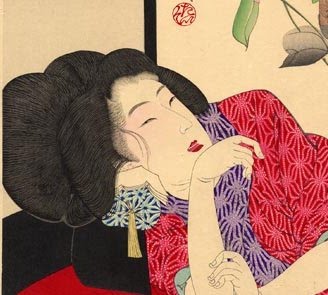 Solve Problems in Your Sleep - Tsukyoka Yoshitoshi 1888 Sleepers Solve Problems Better
Scientists at the University of Luebeck in Germany found that volunteers taking a simple math test were three times more likely than sleep-deprived participants to figure out a hidden rule for converting the numbers into the right answer if they had eight hours of sleep. The results appear in Thursday’s issue of the journal Nature.
The study involved 106 people divided into five separate groups of equal numbers of men and women ages 18 to 32. One group slept, another stayed awake all night, and a third stayed awake all day for eight-hour periods before testing following training in the main experiment. Two other groups were used in a supplemental experiment.
The study participants performed a “number reduction task” according to two rules that allowed them to transform strings of eight digits into a new string that fit the rules. A third rule was hidden in the pattern, and researchers monitored the test subjects continuously to see when they figure out the third rule.
The group that got eight hours of sleep before tackling the problem was nearly three times more likely to figure out the rule than the group that stayed awake at night.
Jan Born, who led the study, said the results support biochemical studies of the brain that indicate memories are restructured before they are stored. Creativity also appears to be enhanced in the process, he said.
“This restructuring might be occurring in such a way that the problem is easier to solve,” Born said.
Born said the exact process in the sleeping brain for sharpening these abilities remains unclear. The changes leading to creativity or problem-solving insight occur during “slow wave” or deep sleep that typically occurs in the first four hours of the sleep cycle, he said.
Better Memory
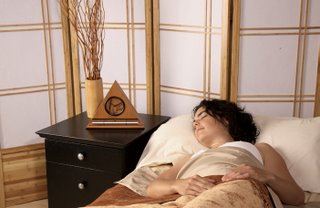 Choose an Alarm Clocks with Real Sounds - Chime or Gong Alarm Clocks Available The results also may explain the memory problems associated with aging because older people typically have trouble getting enough sleep, especially the kind of deep sleep needed to process memories, Born said.
“Even gradual decreases in the total time for slow wave sleep and deep sleep is correlated to a kind of decrease in memory function, and in turn to a decrease in the ability to recognize hidden structures or the awareness of such things,” Born said.
Other researchers said they have long suspected that sleep helps to consolidate memories and sharpen thoughts. But until now it had been difficult to design an experiment that would test how it improves insight.
History is dotted with incidents where artists and scientists have awakened to make their most notable contributions after long periods of frustration. For example, that’s how Russian chemist Dmitri Mendeleev established the periodic table of elements and British poet Samuel Taylor Coleridge wrote his epic “Kubla Khan.”
Born and his team “have applied a clever test that allows them to determine exactly when insight occurs,” wrote Pierre Maquet and Perrine Ruby at the University of Liege in a commentary on the research, also published in Nature.
Maquet and Ruby both say the study should be considered a warning to schools, employers and government agencies that sleep makes a huge difference in mental performance.
The results “give us good reason to fully respect our periods of sleep — especially given the current trend to recklessly curtail them,” they said.
adapted from abcnews.go.com by By William McCall
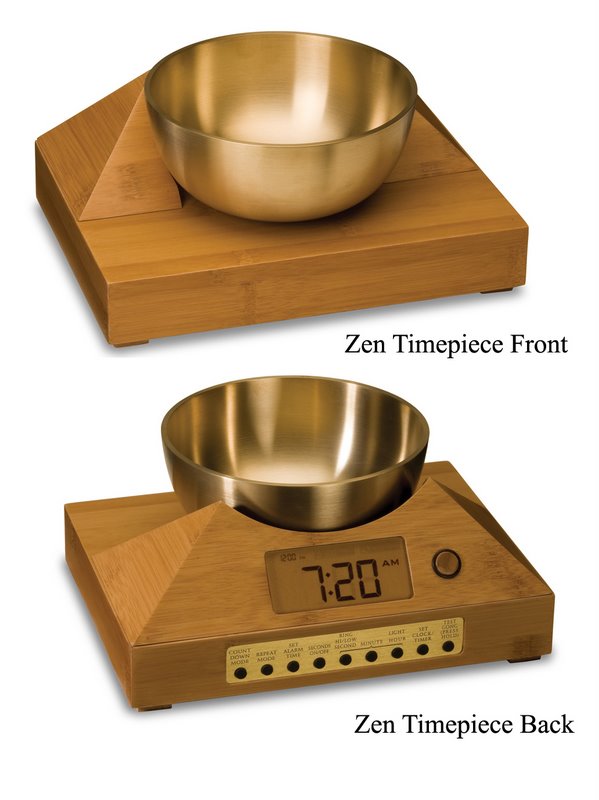 Sleep Sounder - Choose an Alarm Clock with Real Sounds - Chime or Gong Clocks Available Now & Zen
Clocks with Real Acoustic Sounds
1638 Pearl Street
Boulder, CO 80302
(800) 779-6383
The Zen Alarm Clock transforms mornings, awakening you gradually with a series of gentle acoustic chimes Once you use a Zen Clock nothing else will do.
Posted in Bamboo Chime Clocks, sleep, Sleep Habits
« Previous Page — « Previous Entries
Next Entries » — Next Page »
|
|
|
|